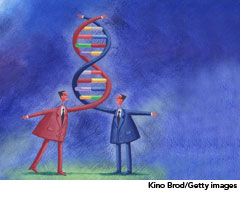No friends? Blame your genes
Genetics may help determine whether you're the center of social circles or lurking at the edges.

Some of us are social butterflies who seem to know everybody. Others of us prefer the quiet corners of life. Either way, a new study says our genes make us do it.
Researchers at Harvard University and the University of California, San Diego, believe there's a genetic component in the formation and configuration of social networks. Comparing identical twins to fraternal twins, the study authors found that both popularity-or the number of times a person was named as a friend-and the likelihood that those friends knew one another were strongly heritable.
Strangely enough, viruses and bacteria may be the evolutionary reason for genetic propensities to be either in the thick of social life or hovering at the edges. If a deadly germ spreads through a community, the least social individuals are least likely to be exposed. So, the researchers posit, it would always be a good thing to have some social outliers when contagious disease strikes. Being in the social circle, however, would be beneficial in sharing information, like the best places to hunt or gather food.
“It may be that natural selection is acting on things like whether or not we can resist the common cold, but also who it is that we are going to come into contact with,” says study co-author James Fowler.